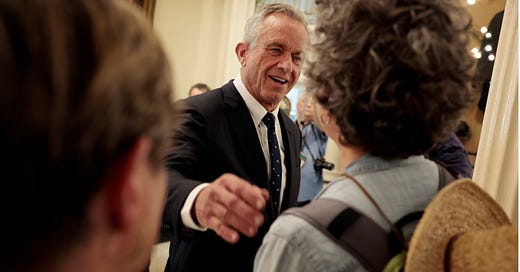On June 20th, Democratic presidential candidate Robert F. Kennedy Jr. delivered a foreign policy speech at Saint Anselm’s College in Manchester, New Hampshire. He started out by thanking the establishment for allowing free speech during a time of censorship.
In his speech, Kennedy called for a diplomatic solution to the war in Ukraine and for the U.S. to end its “endless” military adventures abroad. A video of that speech was later posted on YouTube. In a twist, it was not taken down.
The last time Kennedy spoke at Saint Anselm’s College in March – before he had officially announced his run for the presidency – the recording never made it to YouTube. The event was filmed by Manchester Public TV. When the TV station tried to upload the video on YouTube, it was rejected due to violating the video platform’s ‘medical misinformation’ policy. On its Community Guidelines, YouTube states that “Vaccine Misinformation” is not allowed on the platform.
Following the March censorship, a YouTube spokesperson told the Boston Globe that YouTube’s policies were enforced in Kennedy’s case as they are policies for everyone, regardless of a speaker’s political views.
There have been hundreds of political events at Saint Anselm’s College organized by the New Hampshire Institute of Politics, all across the political sphere, from Donald Trump to Bernie Sanders. However, Kennedy’s speech is the only one to have been censored by YouTube.
***
A large part of Kennedy’s censored, one-hour-long speech concerned vaccines. Kennedy told the story about how he got interested in vaccine safety. But he never said that vaccines are dangerous or that they should be banned. When talking about his concerns about vaccines, he said, “Maybe I’m wrong.”
Kennedy also talked about censorship and how it doesn’t change the way people believe; changing beliefs, he said, must come through persuasion. He pointed out that his father, Robert F. Kennedy, Sr. often told him, “Democracy depends on a free flow of information.”
On the surface, YouTube appears to support a free flow of information, too. “YouTube also believes people should be able to share their own experiences, including personal experiences with vaccinations,” the platform writes regarding vaccine ‘misinformation.’ This means we may make exceptions for content in which creators describe firsthand experiences from themselves or their family.”
When put into context, YouTube's censorship policies appear contradictory. In fact, videos of Kennedy’s recent appearances in New Hampshire are still on YouTube, including the clip preceding a town hall on June 23rd, where Kennedy answered questions about his views on vaccines.
The Kennedy Beacon reached out to YouTube about its censorship policies but did not receive an answer.
At the moment, New Hampshire is scheduled to hold its Democratic primary for the 2024 presidential election on February 6th. The state has traditionally been the first state to hold primaries. But, the Democratic National Committee wants South Carolina to hold its primary first, on February 3rd. For this reason, President Biden’s name might not be on the ballot at all in the New Hampshire primaries.
***
This is not the first time YouTube’s policies regarding censorship have been ambiguous and controversial. Another example occurred in March 2022, when the platform took down an episode of the morning show, “Rising,” produced by The Hill.
In this episode, the hosts discussed Donald Trump’s claims that the election was stolen. The hosts did not support Trump’s views; they merely showed a clip of Trump's claims and then discussed the clip.
YouTube doesn’t only censor content they interpret as misinformation, they also censor content that discusses misinformation. As one of the show’s hosts, Robby Soave, pointed out in his column: “YouTube won't distinguish between misinformation and reporting.”
YouTube's rationale to take down the episode was simply that it violated the election “misinformation policy.”
YouTube censorship has been arbitrary at best. If a video can be taken down just because it shows people discussing unverified information, censorship will never end.





These content reviewers are also volunteering their time to protect Google from refunding advertiser spend, as advertisers can claim that suddenly not all publicity is good publicity. YouTube’s system broken on so many layers.
It might seem like these speech police are just tools of the corporations, but they actually have the power to at least demonetize anything they dislike when they can’t notch another censoring under their belts.
On public policy: I see decentralization having the greatest impact in everyone’s lives in the information space more so than money. There’s no good reason to concentrate content into the hands of corporations, and work on socially oriented protocols that are platform agnostic is going to be necessary for democracy to survive. Such a family of protocols would likely improve targeted ads, and offer the potential to better compensate the content creator.
Never forget these are just ad agencies masquerading as tech companies at this point.
It's outrageous that corporate functionaries at Google get to censor what had previously been the nationwide version of public access TV. But these would-be oligarchs, and the authoritarian apparatchiks in their employ, no longer trust the general public to express itself.